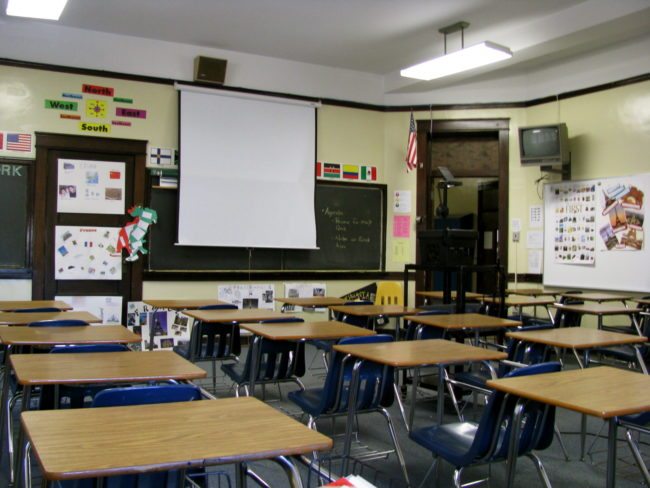Faith schools exposed over policies banning ‘promotion’ of homosexuality

A picture of a gay family from a children’s book (STR/AFP/Getty Images)
A report has found that some English faith schools continue to hold policies banning the “promotion” of homosexuality more than a decade after the repeal of Section 28 – while others are teaching kids that gay sex is “unnatural” and leads to risk of AIDS.
The National Secular Society (NSS), which opposes faith-based learning, published a report today investigating the teachings of more than 600 state secondary faith schools.
The report found that while many faith schools offer sex and relationship education (SRE), 77% of those with an SRE policy were found to deliver the subject “according to the teachings of the school’s religious ethos, rather than in a secular, impartial manner.”
When it comes to homosexuality, the distinction means a significant proportion of faith schools teach “in a way that presents heterosexuality and heterosexual activities as the ‘ideal’, while LGBT activities are marginalised or condemned.”
A previous Stonewall survey found that only 10 percent of LGBT pupils at faith schools learn about safe sex in relation to same-sex relationships, compared to 20 percent in all schools. LGBT pupils of faith are also more likely to have tried to take their own life than those who are not of faith.

The NSS looked at the stated policies of a string of religious schools.
It found that a number of Catholic schools taught in a way that encouraged gay people to spend their lives celibate in order to avoid “sin”.
The policy at Holy Trinity School in Telford states that “Homosexual orientation is distinguished from the evaluation of the sexual activity of homosexual people. The latter is deemed unacceptable as it does not respect the complimentary nature of male and female since it lacks the life giving potential to proper sexual love.”
St John’s Catholic Comprehensive of Kent’s policy adds: “It is clear that the Church teaches that sexual intercourse finds its proper place and meaning only in marriage and does not share the assumption common in some circles that every adult person needs to be sexually active.
“This teaching applies to all, whether married or unmarried, homosexual or heterosexual, engaged, single through choice, widowed or divorced.”
St John’s adds that “families should be given respectful pastoral guidance, so that those who manifest a homosexual orientation can receive the assistance they need to understand and fully carry out God’s will in their lives.”
A string of policies at Catholic schools quote Church teachings that homosexuals are “objectively disordered”.

St Patrick’s Catholic College in Stockton-on-Tees adds: “The Church teaches that there can be no moral right to homosexual acts, even though they are no longer held to be criminal in many secular legal systems.”
Several Church of England schools were also found to have concerning policies on LGBT issues.
At least one school, St Peter’s Academy, The Sir Robert Woodard Academy in Lancing, has a policy banning the “promotion of homosexuality”, aping the language of long-defunct law Section 28.
It states: “Woodard recognises the need to address homosexuality and the need to provide education related to the spread of HIV/AIDS which will, of necessity, include reference to homosexuals, bisexuals and heterosexuals.
“Woodard and the academy will not permit the promotion of homosexuality. Objective discussion of homosexuality may take place in the classroom.”
Windsor’s Churchmead Church of England School states: “The teaching programme takes into account the sensitive issue of homosexual behaviour.
“It needs to be dealt with objectively and seriously, bearing in mind the need to acknowledge its relevance for a significant number of people. At the same time it must be also recognised that for many people, including some religious faiths, homosexual practice is not morally acceptable, and deep offence may be caused if the subject is not handled with great sensitivity.”
The report also looked at teachings of other faiths.
The SRE policies of the Jewish schools Hasmonean High School and The King David High School in Manchester make references to the “destruction of Sodom” and “the chapters in Leviticus dealing with Relationships”, both of which are generally taken as teachings that homosexual acts are immoral and punishable by death.
Beis Yaakov High School states that it “safeguards” pupils from teachings that would “would go against their religious and cultural beliefs,” hinting that inclusive attitudes to LGBT relationships may not be taught at all.

Birmingham’s Islamic school Al-Hijrah’s policy only specifies that its SRE provision includes “discussion of homosexuality and lesbianism, including an Islamic view of them”. The same school also warns that teaching girls about use of tampons “may not be appropriate due to insertion.”
After the report’s findings, the NSS has written to education secretary Damian Hinds, as the government continues to draw up new statutory guidance for SRE.
The former Education Secretary Justine Greening had said that all schools would be required to provide LGBT-inclusive SRE, but Hinds has backed away from the pledge.
NSS chief executive Stephen Evans urged him to make sure that the topic is taught in a “consistent and impartial way, based solely on recommendations from experts.”
Evans wrote: “Government policy must endeavour to ensure all pupils at all schools, regardless of their religious ethos, are entitled to the same basic level of SRE.”
“Our Unsafe Sex Education report demonstrates the ways that basing Sex and Relationships Education on religious scripture can harm young people.
“All of our students should have the right to access education that will give them clear and accurate information on topics that are so important to their wellbeing. Our report demonstrates that state-funded faith schools are letting young people down in this respect, and it is important that we protect their right to impartial Sex and Relationships Education.
“Allowing faith schools leeway to teach about sex and relationships in accordance with their faith will undermine plans to ensure that every child has access to age appropriate Sex and Relationships Education, taught in a consistent way.
“We therefore urge the Department for Education to resist pressure from religious groups to provide wiggle room for faith schools to promote religious ideology in SRE, or avoid aspects of SRE that conflict with their worldview.”

